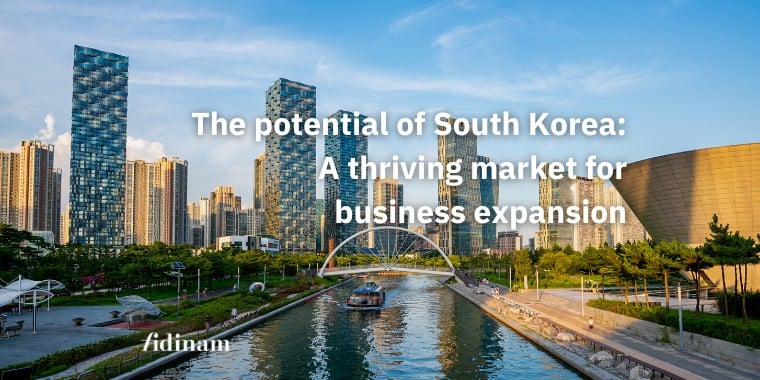
Situated in a strategically important region among global economic powerhouses like Japan and China, South Korea has emerged as a dynamic hub of innovation and economic vitality.
Home to over 51 million people and generating a GDP of US$1.6 trillion (2022), it is the world's 12th largest economy and the 4th largest in Asia.
Here's why South Korea could be your next business destination.
The Republic of Korea (ROK) has all the elements that foreign investors crave - political stability, public safety, world-class infrastructure, and a highly skilled workforce.
The vibrant private sector has made significant strides since the market liberalization measures of the 1990s. In fact, foreign portfolio investment has grown to exceed 37% of the Korea Composite Stock Price Index (KOSPI) total market capitalization as of February 2022.
The South Korean consumer base is sophisticated and affluent, displaying a keen interest in the latest global trends and products. This is especially true among younger generations with significant disposable income, international exposure, and a willingness to engage with new products.
Furthermore, South Korea's workforce is well-known for its discipline, loyalty, and education, resulting in an environment ripe for innovation and growth.
South Korea's reputation as a technological powerhouse is well-earned. From producing world-class electronics such as semiconductor chips, flat-screen TVs, and mobile phones to leading in steel, automotive production, and shipbuilding, its contribution to the global market is significant.
Renowned companies like Samsung, one of the world's largest electronics firms, call South Korea home.
Apart from electronics, South Korea is also forging paths in fields like artificial intelligence, biotechnology, and green energy solutions.
The nation's commitment to innovation and R&D activities, backed by substantial government support, makes it an appealing destination for tech-savvy entrepreneurs.
Earlier this year, an independent research revealed that South Koreans are the world’s biggest spenders on personal luxury goods (apparel, footwear, watches, jewellery, bags, and other fashion accessories) . Total spending on these items grew 24% in 2022 to US$16.8 billion, or about $325 per capita. The South Korean luxury goods market is projected to register a compound annual growth rate (CAGR) of 4.82% during 2022-2028.
The demand for luxury goods in South Korea is driven by an increase in purchasing power as well as a youth-inspired culture that emphasizes external appearance and personal grooming. Additionally, demand is further catalyzed by celebrity endorsements. Nearly all of the major Korean celebrities are brand ambassadors of the leading luxury houses.
South Korea boasts a globally envied infrastructure that goes beyond rails, roads, airports and docks. With about 92% of the population having internet access, South Korea leads the world in virtual connectivity.
This connected landscape provides fertile ground for technological products and services, making it an enticing market for investors in this sector.
Foreign Direct Investment (FDI) in South Korea comes with numerous benefits, particularly in the hi-tech sector.
There are special concessions and tax exemptions, including property taxes, acquisition taxes, customs duty, value-added tax, and corporate tax. Other incentives to create an attractive environment for foreign investors include:
South Korea has many Free Trade Agreements in place, notably with ASEAN, China, EFTA, EU, India, the UK, the US and many more.
It is also a member country of the Regional Comprehensive Economic Partnership (RCEP) with Australia, Brunei, Cambodia, China, Indonesia, Japan, Laos, Malaysia, Myanmar, New Zealand, the Philippines, Singapore, Thailand and Vietnam.
A full list of bilateral investment treaties can be found here.
It is important to note that restrictions on foreign ownership remain in 30 industrial sectors, three of which (nuclear power generation, radio broadcasting and television broadcasting) are completely closed to foreign investment.
Investment in conditionally or partly restricted sectors must be approved by the relevant government ministry. Ceilings are capped at 49.99%; however, recent relaxations signal a positive trajectory, and opportunities far outweigh the constraints.
In July 2020, the Ministry of Economy and Finance shared a national development strategy to support the country's recovery from the pandemic crisis and lead the global action against structural changes with the international community. The Korean New Deal aims to invest over KRW 100 trillion to create 1,901,000 jobs by 2025 based on two main policies: (i) the Digital New Deal and (ii) Green New Deal.
This visionary plan offers unique opportunities for investors, especially in sectors such as renewable energy, smart healthcare and AI.
Are you interested in learning more about doing business in South Korea? Fidinam supports international clients looking to invest and set up a business in South Korea through services such as market-entry services, incorporation of Korean entities, accounting, tax, payroll and immigration services.
For more information, fill in the form below or email us at info@fidinamgw.com.
All content © . All Rights Reserved.